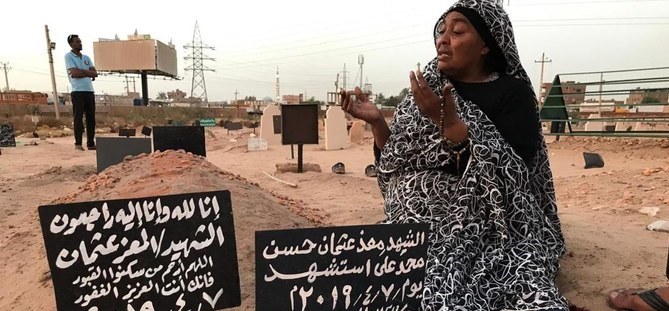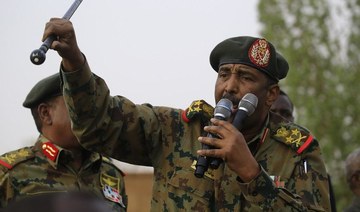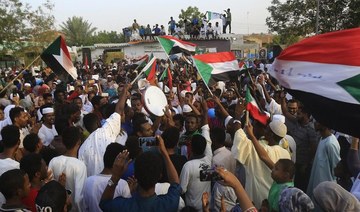AL-RIMELA, Sudan: Amidst mounds of sand capped by hand-written signs naming the dead, Khadom embraces the tomb of her son, one of the more than 200 killed in Sudan’s months-long turmoil.
It was an April morning when a freshly-shaven Al-Moez drank his tea before heading out to the office from the modest home he shared with his parents in Al-Rimela, southern Khartoum.
His office was in the same building as Qatar-based news channel Al-Jazeera and near a longstanding protest camp outside army headquarters in central Khartoum.
“The building was under surveillance by the all-powerful National Intelligence and Security Service (NISS),” Khadom told AFP.
Shortly after he arrived at work, a colleague started to take pictures with his mobile phone from a window of their office.
Out of nowhere, a bullet pierced the window and lodged itself in the heart of Al-Moez who was standing nearby. The 45-year-old died on the spot.
Like dozens of others who lost a son, uncle or brother, the family has paid a high price for Sudan’s revolution that toppled its longtime autocratic ruler Omar Al-Bashir in April.
And now Al-Moez’s family want justice.
His parents have called for an official investigation and for his killer to pay the “eye for an eye” penalty.
But Khadom says there is little chance the case will come to trial or that the NISS will be found guilty.
Anti-regime protests which first broke out on December 19 after the tripling of bread prices have cost the lives of more than 200 demonstrators, according to doctors close to the protest movement.
Gatherings have been staged in front of the homes of the “martyrs,” whose portraits have been painted on walls across the capital.
Outside a rundown apartment block in central Khartoum, two little boys, Ahmed and Asir, are often seen waving small Sudanese flags at motorists.
“Blood for blood, we don’t want compensation!” they chant if security forces pass by in their pickups.
Their uncle, Ali, 25, was felled by a bullet in the back on June 3, the day gunmen in military uniform brutally dispersed the sit-in outside army headquarters that was in place since April 6.
More than 100 lives were lost that day alone and over 500 people wounded, according to the doctors.
“My brother died a martyr. We’re proud and I’m also prepared to die for the revolution,” said Yussef, 35, as tears welled up in his eyes.
Eman, 24, also lost a brother in the massacre at the sit-in, which the protesters had initially launched to demand Bashir’s ouster and later to call on the generals to transfer power to a civilian administration.
A student in England, Mattar was back to visit the family and had just celebrated his 26th birthday when he decided to spend a night with the demonstrators at the sit-in.
“They killed him without mercy,” said Eman, whose brother’s fate evoked a campaign of solidarity on social media under the hashtag #blueformattar.
“Mattar gave his life. Now things in Sudan must change.”
Last Friday, crowds of jubilant Sudanese took to the streets to celebrate a landmark deal between protest leaders and ruling generals aimed at turning the page on seven months of political unrest.
Protest leaders said they had agreed on a transition period of three years and three months, with the first 21 months presided over by a military nominee, and the last 18 months by a civilian.
Demonstrators greeted the breakthrough with chants of “the martyrs’ blood has not been shed in vain” and “civilian rule, civilian rule.”
But Yussef, at the center of the protests from the outset, said he would keep demonstrating because nothing significant would come from Sudan’s military.
“We still have a long way to go for a new Sudan... We must keep up the fight for future generations,” he said, glancing over at his sister’s boys Ahmed and Asir.
Grief-struck families of Sudan’s revolution seek justice
Grief-struck families of Sudan’s revolution seek justice

- Anti-regime protests which first broke out on December last year have cost the lives of more than 200 demonstrators
- Gatherings have been staged in front of the homes of the “martyrs”
Gaza baby rescued from dead mother’s womb dies

- Doctors were able to save the baby, delivering her by Caesarean section
- The baby suffered respiratory problems and a weak immune system, said Doctor Mohammad Salama who had been caring for Sabreen Al-Rouh
RAFAH, Gaza Strip: A baby girl who was delivered from her dying mother’s womb in a Gaza hospital following an Israeli airstrike has herself died after just a few days of life, the doctor who was caring for her said on Friday.
The baby had been named Sabreen Al-Rouh. The second name means “soul” in Arabic.
Her mother, Sabreen Al-Sakani (al-Sheikh), was seriously injured when the Israeli strike hit the family home in Rafah, the southernmost city in the besieged Gaza Strip, on Saturday night.
Her husband Shukri and their three-year-old daughter Malak were killed.
Sabreen Al-Rouh, who was 30-weeks pregnant, was rushed to the Emirati hospital in Rafah. She died of her wounds, but doctors were able to save the baby, delivering her by Caesarean section.
However, the baby suffered respiratory problems and a weak immune system, said Doctor Mohammad Salama, head of the emergency neo-natal unit at Emirati Hospital, who had been caring for Sabreen Al-Rouh.
She died on Thursday and her tiny body was buried in a sandy graveyard in Rafah.
“I and other doctors tried to save her, but she died. For me personally, it was a very difficult and painful day,” he told Reuters by phone.
“She was born while her respiratory system wasn’t mature, and her immune system was very weak and that is what led to her death. She joined her family as a martyr,” Salama said.
More than 34,000 Palestinians, many of them women and children, have been killed in the six-month-old war in Gaza between Israel and Hamas militants, according to the Gaza health ministry. Israel denies deliberately targeting civilians in its campaign to eradicate Hamas.
Much of Gaza has been laid to waste by Israeli bombardments and most of the enclave’s hospitals have been badly damaged, while those still operating are short of electricity, medicine sterilization equipment and other supplies.
“(Sabreen Al-Rouh’s) grandmother urged me and the doctors to take care of her because she would be someone that would keep the memory of her mother, father and sister alive, but it was God’s will that she died,” Salama said.
Her uncle, Rami Al-Sheikh Jouda, sat by her grave on Friday lamenting the loss of the infant and the others in the family.
He said he had visited the hospital every day to check on Sabreen Al-Rouh’s health. Doctors told him she had a respiratory problem but he did not think it was bad until he got a call from the hospital telling him the baby had died.
“Rouh is gone, my brother, his wife and daughter are gone, his brother-in-law and the house that used to bring us together are gone,” he told Reuters.
“We are left with no memories of my brother, his daughter, or his wife. Everything was gone, even their pictures, their mobile phones, we couldn’t find them,” the uncle said.
UN denounces ‘more serious’ Iran crackdown on women without veils

- Hundreds of businesses including restaurants and cafes have been shut down for not enforcing the hijab rule
- More women began refusing the veil in the wake of the 2022 death in custody of 22-year-old Mahsa Amini
GENEVA: The United Nations said Friday that it was concerned by reports of new efforts to track and punish Iranian women, some as young as 15, who refuse to wear the headscarf required under the country’s Islamic law.
The UN Human Rights Office also expressed alarm about a draft bill on “Supporting the Family by Promoting the Culture of Chastity and Hijab,” which would impose tougher sentences on women appearing in public without the hijab.
“What we have seen, what we’re hearing is, in the past months, that the authorities, whether they be plainclothes police or policemen in uniform, are increasingly enforcing the hijab bill,” Jeremy Laurence, a spokesman for the office, said at a press conference.
“There have been reports of widespread arrests and harassment of women and girls — many between the ages of 15 and 17,” he said.
Iranian police announced in mid-April reinforced checks on hijab use, saying the law was increasingly being flouted.
Hundreds of businesses including restaurants and cafes have been shut down for not enforcing the hijab rule, and surveillance cameras are being used to identify women without it, Laurence said.
More women began refusing the veil in the wake of the 2022 death in custody of 22-year-old Mahsa Amini after her arrest by Iran’s morality police for allegedly breaking the headscarf law, which sparked a wave of deadly protests against the government.
Laurence said that on April 21, “the Tehran head of the Islamic Revolutionary Guard Corps announced the creation of a new body to enforce existing mandatory hijab laws, adding that guard members have been trained to do so ‘in a more serious manner’ in public spaces.”
And while the latest draft of the new hijab bill has not been released, “an earlier version stipulates that those found guilty of violating the mandatory dress code could face up to 10 years’ imprisonment, flogging, and fines,” he said, adding that “this bill must be shelved.”
The Human Rights Office also called for the release of a rapper sentenced to death for supporting nationwide protests sparked by Amini’s death.
Toomaj Salehi, 33, was arrested in October 2022 for publicly backing the uprising.
“All individuals imprisoned for exercising their freedom of opinion and expression, including artistic expression, must be released,” Laurence said.
UN seeks to deescalate Sudan tensions amid reports of possible attack

- UN Secretary-General Antonio Guterres’ envoy is engaging with all parties to deescalate tensions
UNITED NATIONS: The United Nations is increasingly concerned about escalating tensions in Al-Fashir in Sudan’s North Dafur region amid reports that the Rapid Support Forces are encircling the city, signaling a possible imminent attack, the UN’s spokesperson said on Friday.
UN Secretary-General Antonio Guterres’ envoy is engaging with all parties to deescalate tensions in the area, the spokesperson said.
Israeli army says missile fire kills civilian near Lebanon

- The violence has fueled fears of all-out conflict between Iran-backed Hezbollah and Israel
- “Overnight, terrorists fired anti-tank missiles toward the area of Har Dov in northern Israel,” the Israeli army said
JERUSALEM: The Israeli army said Friday a civilian was killed near the country’s northern border with Lebanon, as near-daily exchanges of fire with Hezbollah rage.
Both sides have stepped up attacks this week, with Hezbollah increasing rocket fire and Israel saying it had carried out “offensive action” across southern Lebanon.
The violence has fueled fears of all-out conflict between Iran-backed Hezbollah and Israel, which last went to war in 2006.
“Overnight, terrorists fired anti-tank missiles toward the area of Har Dov in northern Israel,” the Israeli army said, referring to the disputed Shebaa Farms district.
“As a result, an Israeli civilian doing infrastructure work was injured and he was later pronounced dead.”
Israeli media reported that the victim was an Arab-Israeli truck driver. Police told AFP they had not identified the body, but said it was the only one found after a truck was hit.
Hezbollah said it had destroyed two Israeli vehicles in the Kfarshuba hills overnight in a “complex ambush” on a convoy using missiles and artillery.
The Israeli army did not comment directly on the claim.
It said Israeli fighter jets struck Hezbollah targets around Shebaa village in southern Lebanon including a weapons store and a launcher, while soldiers “fired to remove a threat in the area.”
It said fighter jets also “struck Hezbollah operational infrastructure in the area of Kfarshuba and a military compound in the area of Ain El Tineh in southern Lebanon.”
Lebanon’s official National News Agency reported that Shebaa village, Kfarshuba and Helta were targeted by “more than 150 Israeli shells,” leaving homes damaged.
Iran-backed Hezbollah has been trading almost-daily fire with the Israeli army since the day after its Palestinian ally Hamas carried out an unprecedented attack on Israel on October 7.
Since October 8 at least 380 people have been killed in Lebanon, including 252 Hezbollah fighters and dozens of civilians, according to an AFP tally.
Israel says 11 soldiers and nine civilians have been killed on its side of the border.
Tens of thousands of people have been displaced on both sides.
EU commits $73 million more for Gaza aid

- New EU aid would be focused on food deliveries, clean water, sanitation and shelters
- The EU and United States have demanded that Israel allows more aid into Gaza
BRUSSELS: The European Union on Friday said it was giving an extra 68 million euros ($73 million) to provide desperately needed aid to Palestinians in Gaza.
The territory has been devastated by more than six months of Israeli bombardment and ground operations after Hamas’s October 7 attack, leaving the civilian population of two million people in need of humanitarian assistance to survive.
“In light of the continued deterioration of the severe humanitarian crisis in Gaza, and the steady rise of needs on the ground, the (European) Commission is stepping up its funding to support Palestinians affected by the ongoing war,” an EU statement said.
“This support brings total EU humanitarian assistance to 193 million euros for Palestinians in need inside Gaza and across the region in 2024.”
The EU said the new aid would be focused on food deliveries, clean water, sanitation and shelters, and would be channelled through local partners on the ground.
The United Nations has said Israel’s operation has turned Gaza into a “humanitarian hellscape,” amid fears of a looming famine.
The EU and United States have demanded that Israel allows more aid into Gaza.
The US military said on Thursday it had begun construction of a pier meant to boost deliveries to the territory.
The war in Gaza began with an unprecedented Hamas attack on Israel on October 7 that resulted in the deaths of about 1,170 people in Israel, according to an AFP tally of Israeli official figures.
Israel vowed to destroy Hamas, with a retaliatory offensive that has killed at least 34,356 people in Gaza, mostly women and children, according to the Hamas-run territory’s health ministry.






















